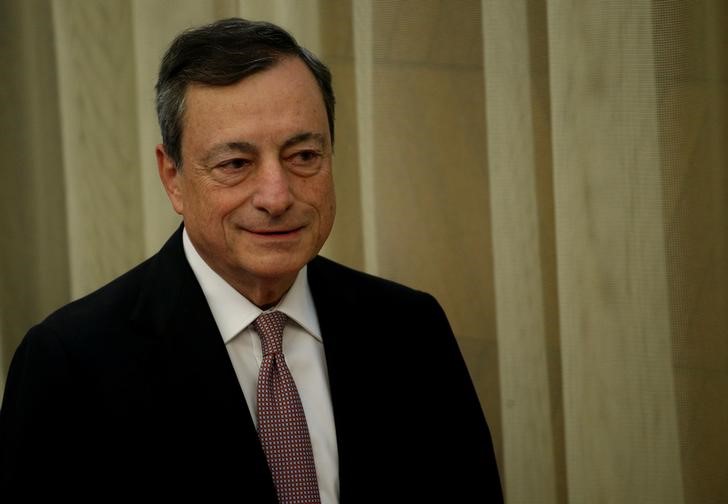FRANKFURT (Reuters) - Euro zone growth may be improving but inflation remains subdued and still requires substantial stimulus, European Central Bank President Mario Draghi said on Monday, tempering expectations for the bank's June 8 policy meeting.
With euro zone growth on its best run since the bloc's crisis a decade ago, pressure from more conservative countries has been mounting on Draghi to start planning an exit from its policy of aggressive bond purchases and sub-zero rates, setting up June as a potentially key meeting.
Still, with wage growth remaining subdued and underlying inflation weak, Draghi argued that the extraordinary monetary policy support was still needed to raise inflation back to the bank's 2 percent target.
"For domestic price pressures to strengthen, we still need very accommodative financing conditions, which are themselves dependent on a fairly substantial amount of monetary accommodation," Draghi told the European Parliament's committee on economic affairs.
German bond yields fell a touch and the euro eased slightly as investors considered Draghi's comments relatively dovish.
With growth picking up, ECB policymakers are expected to say risks to the economic outlook are no longer predominantly negative when they meet next week.
"At its June monetary policy meeting the Governing Council will receive an update of the staff projections and a more complete information set on which it will be able to formulate its judgment on the distribution of risks around the most likely outlook for growth and inflation," Draghi added.
But any change in the bank's tone is likely to be nuanced as some policymakers, including chief economist Peter Praet, fear that a bigger move could touch off market turbulence, raising expectations for a more aggressive removal of stimulus.
The ECB has long argued that even with growth picking up, inflation is far from sustainable, requiring the bank to maintain is unprecedented level of stimulus, which includes 2.3 trillion euros ($2.57 trillion) of asset buys and keeping rates in negative territory.

The next big decision for the bank may not come up until the autumn, when it has to decide whether to extend its bond purchase program into next year or start winding it down as now scheduled.